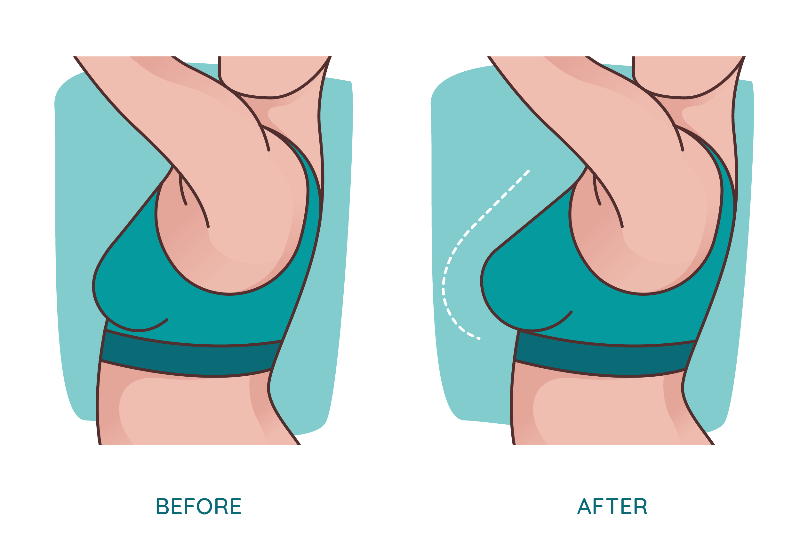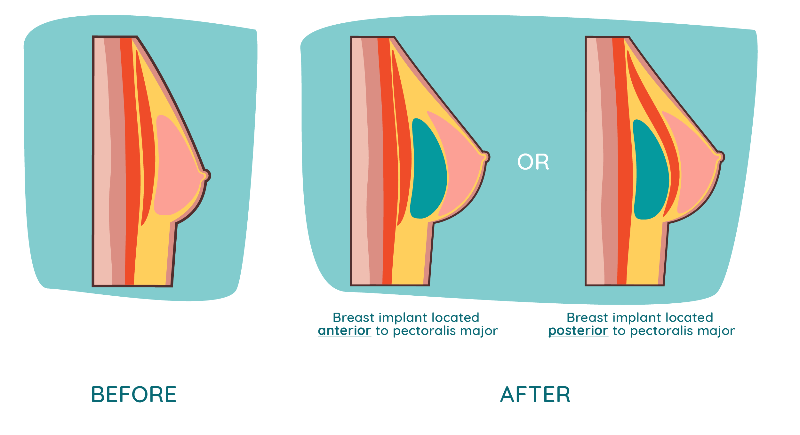Breast enlargement, also known as breast augmentation, is an operation to make your breasts bigger. It usually involves inserting implants underneath your breast tissue, although other techniques can sometimes be used.

Why have a breast enlargement?
You might choose to have breast enlargement if you’re not happy with the size of your breasts. It might be that you have naturally small breasts, or your breasts may have reduced in size following pregnancy. You may also decide to have a breast enlargement to even out your breasts if they’re unequal in size.
How to get a breast enlargement?
If you’re having breast enlargement for cosmetic reasons (to improve how you look), you will most likely need to have it performed privately because the NHS only provides this treatment in exceptional circumstances. These include if you have no breasts, if there is a significant difference in size between your breasts, or as part of a breast reconstruction, which may be required after surgery for breast cancer.
You can find surgeons listed on our website who perform this procedure by using the search functions on the home page. You can explore Patient Reported Outcome Measures (PROMs) on the PHIN website to gain insights into the experiences of other patients following their breast enlargement at individual hospitals.
You should let your GP know if you’re thinking about having breast enlargement surgery so they can advise you on risk factors and be aware of any ongoing care you may need.
Deciding on a breast enlargement
You’ll have an initial consultation with a surgeon to talk about what you’re hoping to achieve from the surgery. They’ll talk to you about the different options available, and it might be that your surgeon recommends a breast uplift instead of, or as well as a breast enlargement.
Your surgeon will want to do a physical examination and assess whether you’re suitable for surgery. They may ask to take some photos of your breasts for your records. You’ll be asked if you would like someone to accompany you before any physical examination. Depending on your age, you may be advised to have a mammogram to check for any signs of breast cancer before going ahead with surgery.
Your surgeon will go through exactly what to expect from the procedure, including the benefits and possible risks. They’ll also talk to you about the different types, sizes and positioning of implants, and discuss what would best suit you.
An alternative method of breast enlargement that doesn’t use implants is called fat transfer or lipofilling. This involves injecting fat from other areas of your body (such as your hips, thighs or tummy) into your breast area. It’s a gradual process that is likely to take a number of operations.
You’ll have some time to think about your decision before committing to surgery. You can find a consultant on our website.
Preparing for breast enlargement
There are various things you can do to prepare for surgery. As for all treatments involving surgery if you smoke it’s best if you stop before your operation. Nicotine has a negative effect on wound healing, and smoking also significantly increases the risk of other complications. Try to lose any excess weight and keep active to maintain your fitness.
Breast enlargement is usually done under general anaesthesia (meaning you’ll be asleep). You may be able to go home on the day of your procedure, or you may need to stay overnight.
What happens during breast enlargement surgery?
Your operation will take 60-90 minutes while you are asleep. Your surgeon will usually make an incision in the crease underneath your breast, but sometimes this may be in your armpit or around your nipple. They’ll then insert the implant. Sometimes this is directly behind your breast, on top of your chest wall muscle, and sometimes it’s placed underneath the muscle in a ‘pocket’ that your surgeon creates.

A timeline for recovery and what to expect after breast enlargement surgery
The following is only a guideline, your surgeon will advise you on how long your own recovery might expect to take.
Day of surgery: Your breasts and chest area will probably feel tender for a while after breast enlargement surgery. The doctors and nurses looking after you will give you painkillers to help manage this. You should be out of bed and moving around after your operation.
- Week 1: You can start driving again.
- Week 2: Your sutures (stitches) will be removed (if required). You can return to work.
- Week 6: You should be able to return to most of your normal activities. Your scars should start to fade.
- Several months: Your breasts should begin to settle down and you can properly judge the results of your operation. Your scars should become paler over time.
You should continue to attend your breast screening appointments after your surgery, as per the NHS Breast Screening Programme.
Events and risks of breast enlargement
All surgical procedures carry some level of risk. Here are some of the events and risks associated with breast enlargement.
Common- between 1 in 10 and 1 in 100 people, which is equivalent to one person in a typical-sized street.
- Tenderness or increased firmness in your breast caused by scar tissue around your implant (known as capsular contracture).
- Alterations in the sensations in your breasts and nipples.
- Implant rupture (leakage) – this is more likely to happen over time. Rupture doesn’t cause any immediate risk for most implants, and you may not even be aware of it. But if you do notice a change in size or shape, contact your surgeon for advice.
Uncommon – between 1 in 100 and 1 in 1,000 people which is equivalent to one person in a village.
- Blood or fluid collecting in the area around your implant.
- Infection.
There’s a risk that you might not be happy with the end result. Breasts are rarely ever symmetrical, and surgery can actually make differences between your breasts more pronounced. You also need to bear in mind that the shape of your breasts will change over time as a natural result of ageing. Pregnancy, breastfeeding and changes in weight will also alter how your breasts look.
Rare – between 1 in 1,000 people and 1 in 10,000 people which is equivalent to one person in a town.
In recent years, there has been growing evidence of a type of cancer that can be associated with breast implants. This is called Breast Implant Associated Anaplastic Large Cell Lymphoma (BIA-ALCL). The risk of this cancer is rare, but it’s important to be aware of. Your surgeon can give you more information about this.
How long do breast implants last?
Although breast implants are made to be durable, there’s more chance of them rupturing or other problems developing as time goes by. Around half of all implants may rupture within 15 years. If this happens, you may need revision surgery. You should be prepared for this and the potential costs of future surgeries before you commit to breast enlargement.
Everyone who has a breast implant in the UK, whether on the NHS or through a private provider, has their details added onto the NHS England’s Medical Device Outcome Registry. This is so you can be traced in the event of an implant recall or specific safety concerns relating to your type of implant.
Breast enlargement costs and fees
As a cosmetic procedure, breast enlargement wouldn’t typically be available through private medical insurance. You’ll usually need to self-fund this treatment. Breast enlargement costs in the UK vary.
Typically, an initial consultation with the surgeon will cost between £100 and £250, depending on where you live. If you move forwards with the procedure, you’ll be offered one of the following.
An all-inclusive ‘package price’, where you know the full costs before undergoing treatment. Not all consultants and hospitals offer this.
A ‘fee-per-service’ deal, where you receive different invoices from the surgeon, the anaesthetist and the hospital. You often won’t know the full costs until you receive the invoices.
For more information, you can read our guide on self-pay.
Further Reading
‘Your guide to breast augmentation’, jointly published by:
References
- Your guide to breast augmentation. Association of Breast Surgery, British Association of Aesthetic Plastic Surgeons, British Association of Plastic, Reconstructive and Aesthetic Surgeons. baaps.org.uk, published 2021.
- Fardo D, Sequeira Campos M, Pensler JM. Breast augmentation. StatPearls. ncbi.nlm.nih.gov, last updated 14 May 2021.
- Early and locally advanced breast cancer: diagnosis and management. National Institute for Health and Care Excellence (NICE). nice.org.uk, published 05 April 2023.
- Lowes S, MacNeill F, Martin L, et al. Breast imaging for aesthetic surgery: British Society of Breast Radiology (BSBR), Association of Breast Surgery Great Britain & Ireland (ABS), British Association of Plastic Reconstructive and Aesthetic Surgeons (BAPRAS). J Plast Reconstr Aesthet Surg 2018;71(11): 1521-1531. doi: 10.1016/j.bjps.2018.07.004.
- Joint briefing: smoking and surgery. Action on Smoking and Health, the Royal College of Anaesthetists, the Royal College of Surgeons of Edinburgh and the Faculty of Public Health, April 2023. ash.org.uk.
- You and your anaesthetic. Royal College of Anaesthetists, February 2020. rcoa.ac.uk.
- Breast and Cosmetic Implant Registry. NHS Digital. digital.nhs.uk, last edited 12 May 2023.
